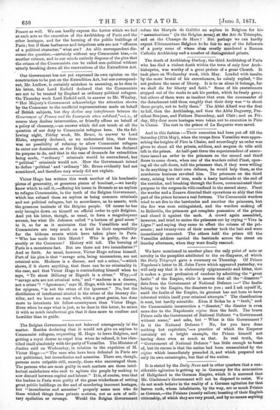Victor Hugo has written this week another of his bombastic
pieces of generosity, or generous pieces of bombast,—we hardly know which to call it,—offering his house in Brussels as an asylum to refugee Communists, in the teeth of the Belgian Government, which has refused them an asylum as being common criminals and not political refugees, but in accordance, as he asserts, with the generous instincts of the Belgian people. Of course he has only brought down on himself an official order to quit Belgium. And yet his letter, though, as usual, in form a magniloquent scream, has what Dr. Johnson called "a bottom of good sense" in it, so far as it maintains that the Versaillists and the Communists are very much on a level in their responsibility for the hideous events which have taken place in Paris. "Who has made the 18th March ? Who is guilty, the As- sembly or the Commune? History will tell. The burning of Paris is a monstrous fact. But are there not two incendiaries ?" And so forth. As usual, however, Victor Hugo refutes himself. Part of his plea is that "savage acts, being unconscious, are not criminal acts. Madness is a disease, and not a crime,"—which shows, if it shows anything, that there can be no criminality in the case, and that Victor Hugo is contradicting himself when he says, " To shoot Billioray or Rigault is a crime." Why,—if "savage acts are not criminal acts," and "madness is a disease, not a crime "? "ignorance," says M. Hugo, with his usual craving for epigram, "is not the crime of the ignorant." No, but the distillation of intellectual alcohol is the crime of the literary dis- tiller, and we know no man who, with a great genius, has done more to intoxicate his fellow-countrymen than Victor Hugo. Even when he says what is just, as he does in this letter, he mixes it with so much intellectual gin that it does more to confuse and bewilder than to guide.


































 Previous page
Previous page